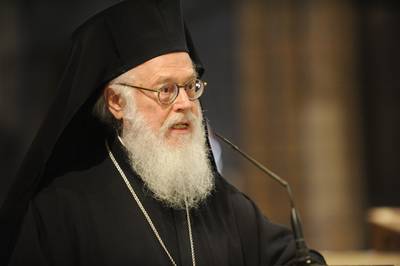The Christians of Europe have a obligation to support the spiritual values that were born among them and in expressing their inner, deeper meaning. I would like to point out a few of these basic values.
The enhancement of any person’s dignity as a basic human right. This principle, on which the legislation of European states is founded, was based on belief formed by the Christian faith. As Berdyaev notes, “Humanism, and therefore human dignity, may be reborn only by arising from the foundation of religion…. Human dignity presupposes the existence of God.” Human dignity is based on the belief than a human being is a holy person, a creation of God personified.
Consequent to this principle is the respect for each and every human being, regardless of origin, sex, education and religious beliefs, as well as the securing of that person’s freedom. Freedom is one of the most fundamental concepts of Christianity. God, who is totally free, created man to be free and therefore responsible for his actions. Dignity, freedom and responsibility are related to each other.
As has been observed by Patriarch Bartholomew, “Our freedom is not only personal but transpersonal. As human beings we cannot be genuinely free while living in seclusion, while denying our relation with our fellow human beings. We can be genuinely free when we become part of a community of other free human beings. Freedom is not being secluded or solitary, but social.”
The biblical belief in marriage and family has shaped the principle of monogamy, which became the nucleus of European society and determined the relations between the two sexes. It enhanced and inspired fidelity and self-abnegation as a basic element of its endurance. When this basic structure is disrupted, society is driven into decline. We, the Christian people of Europe, have the right, but also the responsibility, to defend these truths, on which anything great and pure created by European civilization is based.
Each and every devout Christian is duty-bound to be a responsible citizen of his country and of Europe in general. He has to act consistently, honestly and creatively, he has to contribute to the shaping of a society of human beings, supporting justice, equality and solidarity in an ever-extending radius, beginning with the people within his nation, then embracing all the people of Europe, and expanding his concern for the predominance of these values throughout the world.
The ascetic habit of frugality, clearly prominent in the Eastern Christian Church, is becoming significant nowadays. Its cultivation could contribute to raising a bulwark against the onslaught of consumerism that threatens to overwhelm our life with the accumulation of useless things promoted as necessities.
Despite the progress and the many achievements of Western civilization, certain of man’s characteristics have remained constant through the centuries: greed, violence, arrogance, bigotry and sin in general. In our age, more specifically, our private and social lives have been disrupted with the addition of things such as drugs, AIDS, loneliness, emptiness, a lack of meaning in life. It is certain, however, that idealistic generalities and a wooden tongue that mechanically repeats words of sacred meaning cannot solve these problems. Who will revive the pulse of life? Faith is what we need and an enthusiastic support of Europe’s progress faith in man and his future. The crystal-clear source for this kind of faith remains the truth found in the Gospels.
Yet the great contribution that Christian faith has made is the principle of love; with all its breadth, depth and height, this is the concept that has been given within the Christian faith. In this concept, the emphasis is placed on forgiveness and is of particular importance. The ability to forgive annihilates enmities and leads to reconciliation between individuals and people. The inspiration that the Christian faith has provided to millions of faithful believers, enabling them to experience forgiveness and love, is amply recorded throughout history. Without love, European civilization would be deprived of impetus, strength and beauty.
Therefore, the revival and not the marginalization of the Christian faith, the experience of its essence, power and beauty will help European societies to retain their identity and develop those values that constitute the nucleus of European civilization, as well as their creative drive.
If we Christians are to remain in the spiritual vanguard of modern Europe, we must pay greater attention to a few critical matters of a more general nature.
It is imperative that we oppose all attempts to use religion as an excuse for acts of war, as well as for supporting and strengthening terrorism. In our times, religions still have influence, yet they no longer determine the decisions of political leaders and financial factors. These decisions and factors are based on different criteria and interests. At the same time, however, the lips of conflicting leaders spout religious terms invoking God. In view of this, the religious conscience is called upon to put up the necessary resistance so that religious feeling will retain its sacred role: peace, serenity, forgiveness, healing of wounds.
In the last century, the leading role in achieving social justice and protecting the poor was played in principle by the Communist movement on the basis of atheistic presumptions. In our century, we see certain Islamic groups claiming the leading role in protecting and defending the poor.
It would be one of the greatest scandals if Christians were to remain indifferent to the poor and to ally ourselves mainly with the rich and the powerful. It was Mohammad Yunus, winner of the Nobel Peace Prize for 2006, who pointed out that sixty percent of the Earth’s inhabitants live on only six percent of its resources. The Church has to devote itself to ministering to those in need and giving itself the example of a frugal and abstemious life.
The spiritual principles on which European civilization was founded are universal. New Europe should not withdraw into itself or cater only to its own interests. It has universal responsibilities. This ecumenical vision is a direct consequence of the Christian conscience, and is a spiritual value indisputably European.
Christians have to take initiatives toward solving the world’s problems and to be among the leaders in the struggle for the preservation of the environment and the establishment of world peace. We are envisioning a Europe which will uphold a globalization of justice and solidarity.
Those who belittle the contribution of the Christian faith in the development of Europe often invoke the total dominance of science and technology. Indeed, some of them maintain that science and technology are in conflict with faith. Yet the Christian faith, within the framework of the general respect for the freedom of the human being, also accepts the liberty to seek genuine knowledge.
It is fortunate that, in the Eastern Orthodox tradition, conflict between science and theology has been avoided as much as possible. This is due to the double methodology employed by the Orthodox Fathers of the Church that is based on the ontological distinction between created and uncreated.
Christian thought points out the following: firstly, the dangers lurking behind certain scientific achievements; secondly, the limits of human knowledge; and, thirdly, the existence of another kind of knowledge. We emphasize the respect due to freedom and to the value of scientific research, but in the next phase – that of application and the use of the new knowledge – we proclaim with even greater enthusiasm the importance and the value of a different category: that of love. Love is not directly classified in the scientific field, but it has been absolutely essential in defining the limits of freedom and in developing of the fruits of science, by restricting egocentrism and by providing a genuine communication with our fellow man, in the ultimate union of truth, beauty and love.
This is a shortened version of a paper Archbishop Anastasios, who leads the Orthodox Church in Albania, presented in February 2007. Archbishop Anastasios is a member of the advisory board of the Orthodox Peace Fellowship.
From the Fall 2007 issue of In Communion / IC 47
















